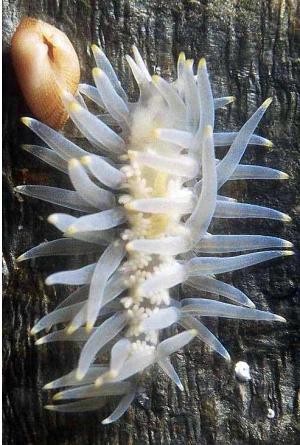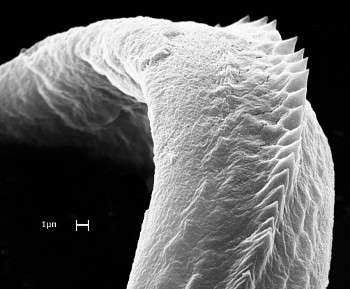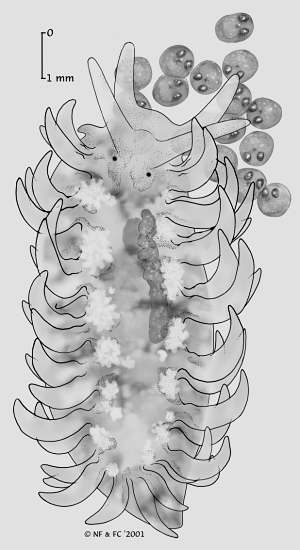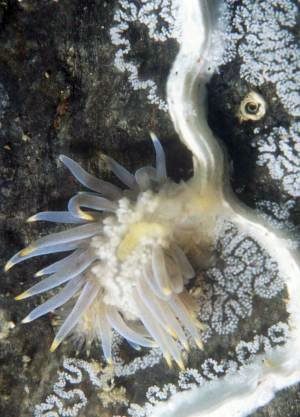

Calma glaucoides
Alder & Hancock, 1854
Order: NUDIBRANCHIA
Suborder: AEOLIDINA
Family: Calmidae
DISTRIBUTION
Northeastern Atlantic from Norway to western Mediterranean.
PHOTO
UPPER: Baie de Peyrefitte (near French/Spanish Mediterranean border), under stones in 4 m deep, in June, 2002. Approx 20 mm long. Photo: Patrick Heurtaux.
LOWER: radular ribbon with indiviudal teeth fused into a serrated ribbon. Scale bar = 1 micron. PHOTO: Gonçalo Calado.
This strange species appears to feed exclusively on the eggs of teleost fish. It grows to about 25mm but is seldom seen outside the fish egg masses it feeds on. The anus is absent, apparently because there is little waste in the highly nutritious food Calma feeds on.
See message from Gonçalo Calado below comparing Calma glaucoides which feeds on eggs of Lepadogaster lepadogaster, Lepadogaster purpurea, Lepadogaster candollei, Parablennius gattorugine and Parablennius pilicornis, with Calma gobioophaga Calado & Urgorri, 2002 which feeds on the spawn of Gobius niger,.
Reference:
• Alder, J. & Hancock, A. (1854). Notice of some new species of British Nudibranchiata. Annals and Magazine of Natural History, 14(2): 102-105
• Calado, G. & V. Urgorri, 2002. A new species of Calma Alder & Hancock, 1855 (Gastropoda: Nudibranchia) with a review of the genus. Journal of Molluscan Studies, 68: 311-317.
Rudman, W.B., 1999 (September 15) Calma glaucoides Alder & Hancock, 1854. [In] Sea Slug Forum. Australian Museum, Sydney. Available from http://www.seaslugforum.net/find/calmglau
Related messages
Re: Unknown white aeolid from French Brittany
August 11, 2006
From: Greg Brown

Concerning message #17145:
Bill and Willfried,
I suggest you consider Calma glaucoides as the ID for this specimen. It has a variable appearance but the cerata clusters are arranged distinctively and argue against a cuthonid. I attach a photo of a well fed, large UK specimen but Bernard Picton's website shows a less superficially pigmented form.
Locality: Penzance, 15m, Cornwall, Atlantic UK, August 1977, unknown. Length: 23 mm. Photographer: finder unrecorded, photo Greg Brown.
Greg Brown
gregory.brown4@ntlworld.com
Brown, G.H., 2006 (Aug 11) Re: Unknown white aeolid from French Brittany. [Message in] Sea Slug Forum. Australian Museum, Sydney. Available from http://www.seaslugforum.net/find/17391Dear Greg,
Thanks for the suggestion. Looking at Gonçalo Calado's photo [message #8267] of a juvenile Calma glaucoides, I can see the same ceratal arrangement and triangular oesophageal-stomach region. I guess I expect C. glaucoides to have the characteristic 'bunches of grapes' white gonad down each side of the dorsal midline, but the gonad is not really visible in juveniles.
Best wishes,
Bill Rudman
Unknown white aeolid from French Brittany
July 29, 2006
From: Wilfried Bay-Nouailhat

Dear Bill
Can you help me for the identification of this small nudibranch found in French Brittany.
Locality: Corven de la Jument, Trégunc, Finistère sud, 8 metres, France, Atlantic Ocean, 14 July 2006, On rocks. Length: 15 mm. Photographer: Wilfried Bay-Nouailhat.
Best wishes
Anne and Wilfried Bay-Nouailhat
contact@mer-littoral.org
Bay-Nouailhat Wilfried, 2006 (Jul 29) Unknown white aeolid from French Brittany. [Message in] Sea Slug Forum. Australian Museum, Sydney. Available from http://www.seaslugforum.net/find/17145
Dear Willy,
I am pretty sure this is a species of Cuthona but I will need some help in identifying the species.
In the close-up photo alongside parts of the digestive system are clealry seen. The whitish triangular object with black speckles is the oesophagus-stomach region, swollen with recently eaten food. The yellowish lines are ducts connecting to the digestive gland duct in each ceras, where the food is digested and absorbed.
Best wishes,
Bill Rudman
Calma glaucoides and C. gobioophaga
October 27, 2002
From: Gonçalo Calado


Dear Bill
The description of the new species of the genus Calma has just been published. Calma glaucoides (Alder & Hancock, 1854) and Calma gobioophaga Calado & Urgorri, 2002 differ consistently in some morphological characters, such as body length and width - C. glaucoides is wider and longer. In the position of the kidney - between the 2nd and the 6th (rarely 5th or 7th) ceratal group in C. glaucoides and between the 2nd and the last ceratal group in C. gobioophaga. In the size and position of the eyes - 80 µm, behind the rhinophores, in the space between these and the first group of cerata in C. glaucoides and 110 µm immediately behind the rhinophores or in its rear border in C. gobioophaga. And in the form and size of the propodial tentacles - small and acute in C. glaucoides and large and finger-like in C. gobioophaga.
Nevertheless, the most important difference is ecological. At least during non-larval life, both species occupy different ecological niches. Whereas Calma gobioophaga feeds on spawn of Gobius niger, Calma glaucoides feeds on eggs of Lepadogaster lepadogaster, Lepadogaster purpurea, Lepadogaster candollei, Parablennius gattorugine and Parablennius pilicornis.
Reference:
Calado, G. & V. Urgorri, 2002 A new species of Calma Alder & Hancock, 1855 (Gastropoda: Nudibranchia) with a review of the genus. Journal of Molluscan Studies, 68: 311-317.
Best wishes,
Gonçalo
bagoncas@mail.telepac.pt
Calado, G., 2002 (Oct 27) Calma glaucoides and C. gobioophaga. [Message in] Sea Slug Forum. Australian Museum, Sydney. Available from http://www.seaslugforum.net/find/8267Dear Gonçalo,
I am glad to see your work comparing C. glaucoides with your new species C. gobioophaga.
Best wishes,
Bill Rudman
Calma glaucoides from French Mediterranean
August 1, 2002
From: Patrick Heurtaux

Here are two photos of Calma glaucoides took in the Baie de Peyrefitte (near French/Spanish Mediterranean border), under stones in 4 m deep, in June, 2002. The size of the two slugs was about 20 mm. In one photo it is laying its eggs on two annelids worm tubes.
Best regards,
Patrick
pheurtau@club-internet.fr


Dear Patrick,
Thanks very much for these photos. I have shown your photos to Gonçalo Calado who discovered a couple of years ago that there are in fact two species which have until now been confused as one. As you will see in his separate message, he considers your animal to be 'true' Calma glaucoides.
Best wishes,
Bill Rudman
Re: Calma glaucoides
August 1, 2002
From: Gonçalo Calado
Hi Bill
As you know, I have been studying this species and discovered that there are in fact two distinct species. Patrick's photo is of a true Calma glaucoides, which most probably has been feeding on the eggs of the fish Lepadogaster sp. That whitish-blue coloration is typical of a mature adult and it never appears in the, at present, unnamed species. Beware that in both species the gonad is visible through the skin. My review of the genus is about to come out in Journal of Molluscan Studies. I already have the complete reference
• Calado, G. & V. Urgorri, 2002 A new species of Calma Alder & Hancock, 1855 (Gastropoda: Nudibranchia) with a review of the genus. Journal of Molluscan Studies, 68: 311-317.
I am planning to give the Forum a report in a few weeks, after the paper is published.
Cheers
Gonçalo
bagoncas@mail.telepac.pt
Calado, G., 2002 (Aug 1) Re: Calma glaucoides. [Message in] Sea Slug Forum. Australian Museum, Sydney. Available from http://www.seaslugforum.net/find/7679Thanks Gonçalo,
I look forward to seeing your paper and your report for the Forum
Bill Rudman
Calma glaucoides
September 16, 1999
From: Gonçalo Calado


Dear slugophiles
I'm a Portuguese PhD student working with one single species at the moment:
Calma glaucoides (Alder & Hancock, 1854) (UPPER PHOTO) is an atypical aeolid nudibranch inhabiting European (Atlantic and Mediterranean) Western and Southern coasts. Adults feed on fish eggs and are found near their spawns underside boulders or in small crevices where male fish nests. This aeolid has a very atypical uniseriate radula (LOWER PHOTO), with a serrated bar. Little is known about its formation or function, but it is believed that such a peculiar morphology is related to adult's feeding habits.
If anyone has preserved specimens they could send me, or could preserve specimens for me, I would be very grateful. I am particularly interested in material from outside the Atlantic coasts of Spain and Portugal.
For those living outside its distribution range, I suggest to look carefully on fish spawns (gobids, blennids, etc). It might be you find something interesting...
Many Thanks,
Gonçalo
Goncalo Calado
Quinta de S. Lourenço, Lote 11, 1o Esq.
Oleiros 2925-260 Azeitao
PORTUGAL
Tel. +351-1-2180337
rakas@mail.telepac.pt
Calado, G., 1999 (Sep 16) Calma glaucoides. [Message in] Sea Slug Forum. Australian Museum, Sydney. Available from http://www.seaslugforum.net/find/1341Dear Gonçalo,
Thanks for sharing some of the information you presented at Menfi. The radula is indeed unusual. Hopefully someone will be able to help you with material from elsewhere in Europe.
Bill Rudman.
